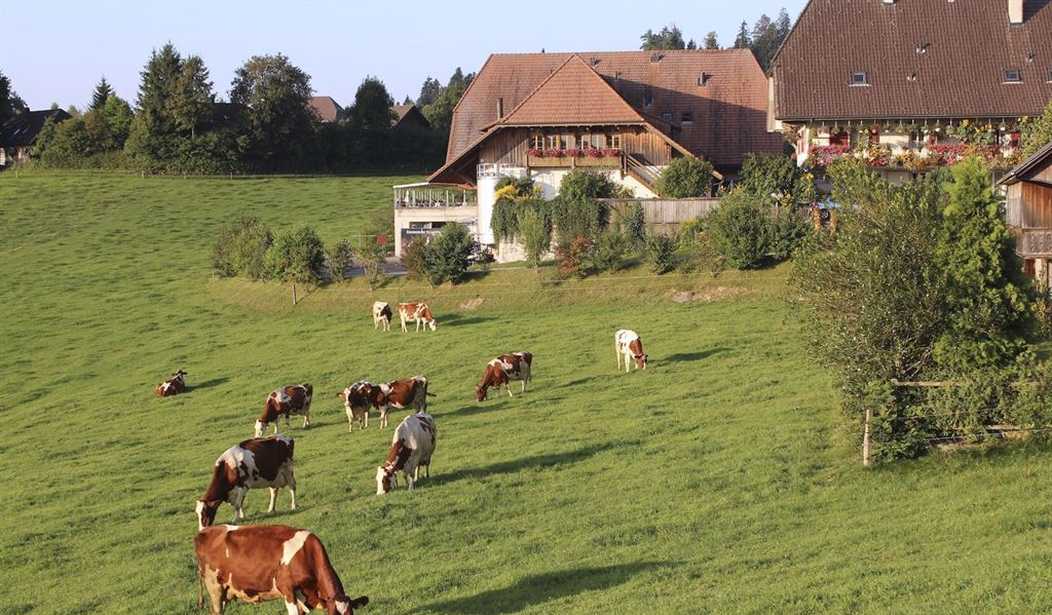Seventy-one percent of the earth’s atmosphere is made up of nitrogen, but we’re told that too much of it can be very, very bad. So the Nitrogen Minister of the Netherlands (yes, that’s a real job), Christianne van der Wal, is spearheading a government effort to drastically reduce nitrogen emitted by too much greenery — especially on very productive farms — and especially close to “environmentally sensitive” areas.
Farmers in the Netherlands have been at war with the government over nitrogen emissions ever since the government announced that there would be a 50% reduction in nitrogen emissions by 2050. Dairy farmers are especially hard hit because waste from the 1.6 million dairy cows in the Netherlands is the largest contributor to nitrogen “pollution.”
“My livelihood and my network is being threatened,” said Ben Apeldoorn, whose farm has about 120 cows producing milk for making cheese. “You’re just no longer allowed to exist,” he told the New York Times.
But it’s all to save the planet, don’t ya know?
“There is no better offer coming,” Nitrogen Minister van der Wal told MPs on Friday. She said compulsory purchases would be made with “pain in the heart,” if necessary.
In other words, take it or leave it, plebes.
JUST IN – Netherlands to "compulsory purchase" and close up to 3,000 farms to comply with EU environmental rules.https://t.co/cX9e6QGihF
— Disclose.tv (@disclosetv) November 28, 2022
Farmers’ lobby group LTO Nederland said trust in the government “has been very low for a long time”. It accused the Government of drafting “restrictions without perspective”.
Sjaak van der Tak, chairman of LTO, said: “Of course it is positive that a good voluntary stop scheme is being promised. But the stayers who are central to us will have many additional restrictions imposed.”
Agractie, another farmers’ organisation, said the voluntary closure scheme was welcome but must not be applied with the threat of compulsory purchase.
There’s a relatively new political party in the Netherlands called BoerBurgerBeweging (BBB) — meaning Farmer-Citizen Movement. It’s taken root and has made a significant impact in the polls. The party is fielding 300 candidates in next year’s provincial elections, and in recent polls, the party ranks fourth among the 17 leading parties.
Caroline van der Plas, the party’s founder and sole MP, believes the party could gain up to eight seats in the 75-seat Dutch Senate.
“So many things are going wrong,” she tells the Guardian. “In the outlying areas, you often hear that in The Hague there is no eye for the human dimension and the small things that are so important in the countryside.”
Henk Vermeer, joint founder and secretary of the BBB, says the party’s can-do spirit and lack of cynicism have struck a chord. “As always, with the provincial elections, it’s a sort of referendum on what people think of the national government. A lot of people are not happy with the established parties. We have a chance of a lot of extra votes.
“Market research shows that a quarter of our seats come from people who didn’t vote before. It is because we, and Caroline, say it as it is, in clear language that is focused on solutions. People understand that we feel their pain,” he says.
The party peaked in the polls in June, when protests by angry farmers against looming shutdowns were reported around the world.
It’s unclear how many “voluntary” takers there will be in the farm sales. It almost certainly won’t be 3,000 — the number the Dutch nitrogen czar says is necessary. But pushback from ordinary farmers and others might force the government to rethink the plan and find a more equitable way to cut nitrogen.









Join the conversation as a VIP Member